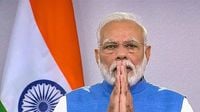In the wake of a devastating terror attack in Pahalgam, Jammu and Kashmir, which claimed the lives of 26 people, Prime Minister Narendra Modi has taken significant actions to bolster national security and address escalating tensions with Pakistan. The attack, which primarily targeted tourists, occurred on April 22, 2025, and has led to a series of government meetings and strategic responses aimed at enhancing India’s defense posture.
During a recent rally in Ranchi, Congress President Mallikarjun Kharge criticized the government, asserting that PM Modi cancelled a planned visit to Kashmir following an intelligence report indicating a potential terror threat. "During the all-party meeting, you (PM Modi) admitted that there was an intelligence flaw," Kharge stated, questioning the government's accountability for the loss of lives in the Pahalgam attack. He emphasized that the Congress party stands united with the government in any action taken against Pakistan, underlining the importance of national unity in times of crisis.
As the nation grapples with the aftermath of the attack, rumors have circulated regarding PM Modi's scheduled address to the public. Initially, some social media outlets claimed he would speak at 8 PM on May 6, 2025, but these reports were misleading. The Prime Minister is set to address the India @ 2047 Summit at Bharat Mandapam in New Delhi, focusing on long-term development goals as the country approaches its centenary of independence in 2047. This event, hosted by the ABP Network, aims to gather policymakers, industry leaders, and innovators to discuss India's future.
Amidst this backdrop, the Ministry of Home Affairs (MHA) has announced a nationwide mock drill set for May 7, 2025, in response to recent security threats, including the Pahalgam incident. This drill is intended to enhance civilian readiness and will involve the activation of air raid sirens, evacuation rehearsals, and simulated blackouts across various cities. It marks the first nationwide drill of its kind since 1971, aimed at improving civil defense preparedness.
In the wake of the Pahalgam attack, tensions between India and Pakistan have surged. Reports indicate that the Pakistani Army engaged in unprovoked small-arms fire across the Line of Control (LoC) during the night of May 5 to the early hours of May 6. In response, PM Modi convened high-level meetings with key defense officials, including Defence Secretary Rajesh Kumar Singh and National Security Advisor Ajit Doval, to discuss India's military strategy and operational readiness.
During these meetings, PM Modi granted complete operational freedom to the armed forces, allowing them to determine the mode, targets, and timing of India's response to the ongoing threats. This approach signals a shift towards a more aggressive stance in dealing with cross-border terrorism and Pakistan's provocations.
In addition to military measures, the Indian government has also taken diplomatic actions against Pakistan. Following the Pahalgam attack, India barred vessels flying the Pakistani flag from its ports, prompting Pakistan to reciprocate by banning Indian-flagged ships. Furthermore, the Cabinet Committee on Security (CCS) has decided to hold the Indus Waters Treaty of 1960 in abeyance until Pakistan "credibly and irrevocably abjures its support for cross-border terrorism." This decision reflects India's commitment to addressing the root causes of terrorism originating from its neighbor.
As part of these punitive measures, India briefly halted the water flow through the Baglihar Dam on the Chenab River on May 5, with plans to implement similar actions at the Kishanganga Dam on the Jhelum River. Such steps are indicative of India's strategy to leverage its water resources as a means of exerting pressure on Pakistan.
Internationally, the Pahalgam attack has drawn condemnation and support from world leaders. Prominent figures, including US President Donald Trump, French President Emmanuel Macron, Israeli Prime Minister Benjamin Netanyahu, and Russian President Vladimir Putin, have reached out to PM Modi, expressing solidarity in India's fight against terrorism.
The Congress party has also voiced its support for the victims' families, urging the government to take decisive action against the perpetrators of the attack. In a statement on social media, the party emphasized the need for a collective national response to curb terrorism and hold those responsible accountable.
The Pahalgam terror attack is one of the deadliest incidents in Jammu and Kashmir since the abrogation of Article 370 in 2019, which revoked the region's special status. This change has been met with increased violence and unrest, raising concerns over the security situation in the area.
As the government prepares for the upcoming mock drills and PM Modi’s address at the India @ 2047 Summit, officials are urging citizens to remain vigilant and rely on official sources for information, especially in light of the misinformation circulating online.
In summary, the Pahalgam attack has not only prompted immediate military and diplomatic responses from the Indian government but has also highlighted the ongoing challenges in the region regarding terrorism and cross-border relations with Pakistan. The situation remains dynamic as the government navigates the complexities of national security while also addressing the aspirations for India’s future development.

